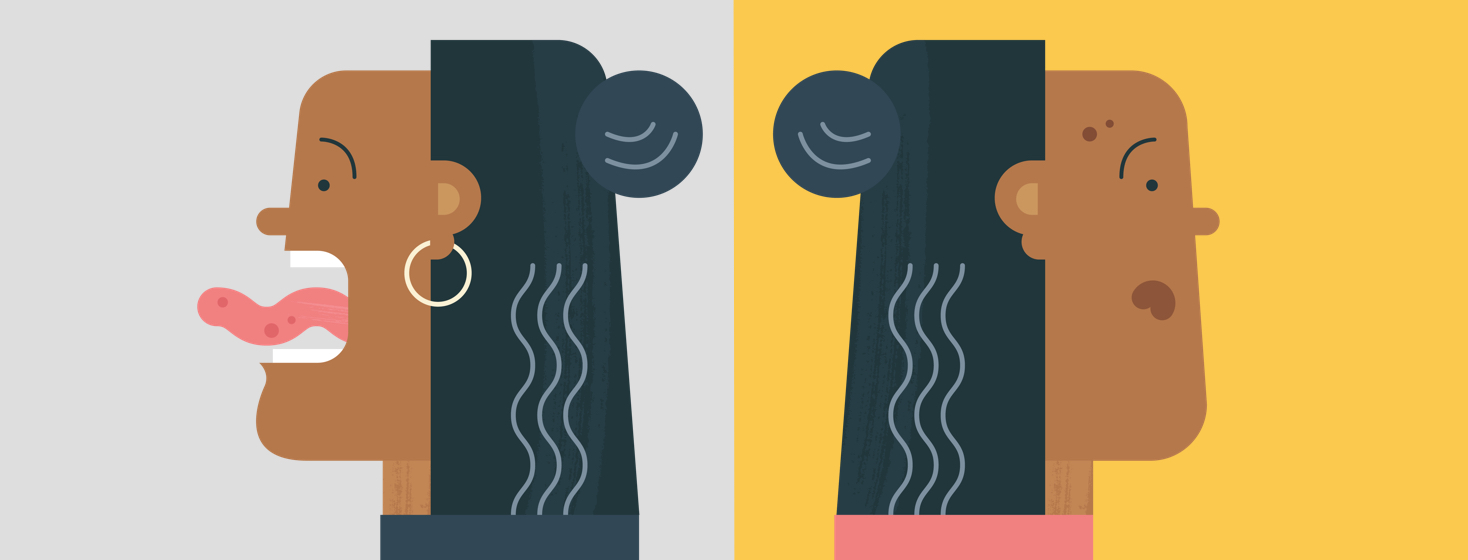Squamous Cell Cancer of the Tongue
When I got squamous cell cancer of the tongue after I got squamous cell cancer of the skin, I thought they were related, but it turns out that they are different kinds of cancer.
My squamous cell carcinoma of the tongue
To back up, after my last bone marrow transplant, I have had more squamous cell cancers of the skin than I can count. The most common type of oral cancer is also a squamous cell carcinoma.1 Squamous cells are the flat, skin-like cells that cover the lining of the mouth, nose, larynx, thyroid and throat.2 Squamous cell carcinoma is the name given to cancer that starts in these cells.
Also known as head and neck cancer
Sounded like the same thing to me. But my dermatologist explained to me that due to the different glands involved, tongue cancer is actually a head and neck cancer.
That is why, for the removal of the cancerous cells discovered on my tongue by accident when I was getting two teeth extracted, I saw head and neck surgeon, Dr. Laura Goguen, at the Dana-Farber Cancer Institute. Physicians at the head and neck cancer department treat cancers of the throat, larynx, nose, sinuses, and mouth.
Her office is on the eleventh floor of Dana-Farber’s Yawkey Center for Cancer Care. I said to myself that it was funny for the Head and Neck Center to be at the top of the building like the head and neck are on top of your body. None of it was funny, but applying a little humor took the edge off my anxiety.
Dental issues led to detection of squamous cell on the tongue
This was one of several instances in which something bad turned out to be good. The bad was the loss of teeth, 12 in total, one or two at a time. A weakened immune system, dry mouth, and growth of bad bacteria – all side effects of chemotherapy – did a number on my teeth. The good was that a dental surgeon noticed an early form of tongue cancer during an extraction at Brigham and Women’s Hospital.
Asleep in dentist’s chair
It was quite a day. After my transplant, my platelets still had not risen to normal levels. I needed platelets for clotting during the surgery (in case of bleeding), so, first, I got a platelet infusion.
To stave off the allergic reaction I had had in the past, I took a Benadryl. It made me drowsy. A dentist back home had told me to take two 1-milligram Ativan tablets before surgery instead of getting anesthesia. So I did that in addition to the Benadryl. My sister practically had to drag me to the surgeon’s office. I could barely keep my mouth open.
Tongue cancer biopsy
Two dentists were in the room. One said, “I think I see tongue cancer.” A friend’s sister had died from the disease. A chill went through me.
They took a biopsy. It took a while to get a definitive answer. The waiting was painful. Finally, I learned that the cells were at an early stage of cancer.
After surgery came intense pain
Dr. Goguen would end up removing a scoop from the left side of my tongue. She later said that to get clean margins, she needed to excise more than she had anticipated.
Some patients get relief from over-the-counter medications, but the throbbing in my mouth responded only to oxycodone. It felt like my bottom left teeth were cutting into the raw edge of my tongue. My dentist wasn’t surprised; he said the tissues in the tongue take a long time to heal.
But heal it did, and after awhile, I realized that the bad luck of losing teeth turned into the good luck of catching this surprise cancer early. For years I saw my surgeon annually, but now I only need my dentist and cancer doctors to check my tongue.

Join the conversation